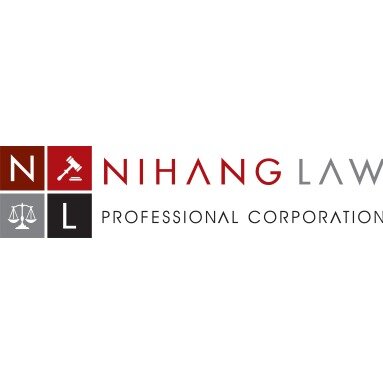Best Natural Resources Lawyers in Toronto
Share your needs with us, get contacted by law firms.
Free. Takes 2 min.
List of the best lawyers in Toronto, Canada
About Natural Resources Law in Toronto, Canada
Natural Resources Law in Toronto, Canada, encompasses a wide range of regulatory frameworks and legal practices focused on the management and use of natural resources such as water, minerals, forests, and land. This area of law is crucial because it ensures that these resources are used sustainably, ethically, and in compliance with both local and federal laws. In Toronto, natural resources law often intersects with environmental law, real estate, and indigenous rights, making it a complex yet necessary field to navigate for businesses and individuals alike.
Why You May Need a Lawyer
There are several common situations in which individuals or businesses may require legal assistance related to natural resources. These include negotiating land use agreements, obtaining permits for natural resource extraction or usage, resolving disputes over water rights, land ownership issues, compliance with environmental regulations, and addressing the rights of indigenous communities. In many cases, legal assistance can help clarify rights and obligations, ensuring that resource use is responsible and sustainable while protecting your interests.
Local Laws Overview
Toronto operates under a wide range of laws and regulations concerning natural resources, including the Ontario Mining Act, Environmental Protection Act, and the Clean Water Act, among others. These laws are designed to balance economic interests with the protection of the environment and public health. Key aspects include regulations on emissions, land use planning, water quality standards, and specific requirements for mineral and resource extraction operations. Compliance is monitored by several regulatory bodies, such as the Ministry of the Environment, Conservation and Parks, and the Ontario Energy Board.
Frequently Asked Questions
What types of natural resources are regulated in Toronto?
The primary natural resources regulated in Toronto include water, land, minerals, forests, and energy resources.
Do I need a permit to extract natural resources on my property?
Yes, typically, you would need to obtain specific permits from governmental bodies to extract natural resources, even on privately owned property. This is to ensure compliance with environmental regulations and sustainable practices.
How are indigenous rights considered in natural resource law?
Indigenous rights are recognized and must be considered in natural resource law decisions, particularly regarding land use, resource extraction, and negotiations with First Nations communities, involving consultation and consent processes.
What should I do if I suspect illegal resource extraction is happening near my property?
If you suspect illegal activity, you should report it to local authorities such as the Ministry of Natural Resources and Forestry. It may also be wise to consult with a legal expert to understand your rights and potential actions.
How are water rights regulated in Toronto?
Water rights are regulated under the Ontario Water Resources Act, which governs the use and quality of water in the province. Permits may be required for extraction, use, and discharge activities.
Are there specific regulations for mining in Toronto?
Yes, mining activities are governed by the Ontario Mining Act, which stipulates standards for exploration, production, and rehabilitation to minimize environmental impact.
What is the role of environmental assessments in resource extraction?
Environmental assessments evaluate the potential impact of proposed projects on the environment and are often mandatory before significant resource extraction activities can commence.
Can natural resources law affect real estate transactions?
Yes, natural resources law can significantly impact real estate transactions, especially if the property in question has existing resource rights or environmental concerns.
Is it necessary to have a lawyer when dealing with natural resource disputes?
Having a lawyer is highly advisable as they can provide expert guidance on legal procedures, rights, and obligations while representing your interests effectively in disputes.
How are penalties for non-compliance with natural resources laws determined?
Penalties are typically determined based on the severity of the violation, the harm caused, and the regulatory standards breached, which can result in fines, operational shutdowns, or legal action.
Additional Resources
For further assistance, consider reaching out to governmental bodies such as the Ministry of Natural Resources and Forestry, legal aid clinics specializing in environmental and natural resources law, or nonprofit organizations like the Canadian Environmental Law Association.
Next Steps
If you require legal assistance, start by consulting with a lawyer who specializes in natural resources law. Consider scheduling an initial consultation to discuss your specific situation and understand your options. Additionally, gathering relevant documentation and understanding the scope of your legal needs can assist in finding the right legal support. Engaging with community advisory groups or legal aid services can also provide valuable insights and referrals.
Lawzana helps you find the best lawyers and law firms in Toronto through a curated and pre-screened list of qualified legal professionals. Our platform offers rankings and detailed profiles of attorneys and law firms, allowing you to compare based on practice areas, including Natural Resources, experience, and client feedback.
Each profile includes a description of the firm's areas of practice, client reviews, team members and partners, year of establishment, spoken languages, office locations, contact information, social media presence, and any published articles or resources. Most firms on our platform speak English and are experienced in both local and international legal matters.
Get a quote from top-rated law firms in Toronto, Canada — quickly, securely, and without unnecessary hassle.
Disclaimer:
The information provided on this page is for general informational purposes only and does not constitute legal advice. While we strive to ensure the accuracy and relevance of the content, legal information may change over time, and interpretations of the law can vary. You should always consult with a qualified legal professional for advice specific to your situation.
We disclaim all liability for actions taken or not taken based on the content of this page. If you believe any information is incorrect or outdated, please contact us, and we will review and update it where appropriate.















